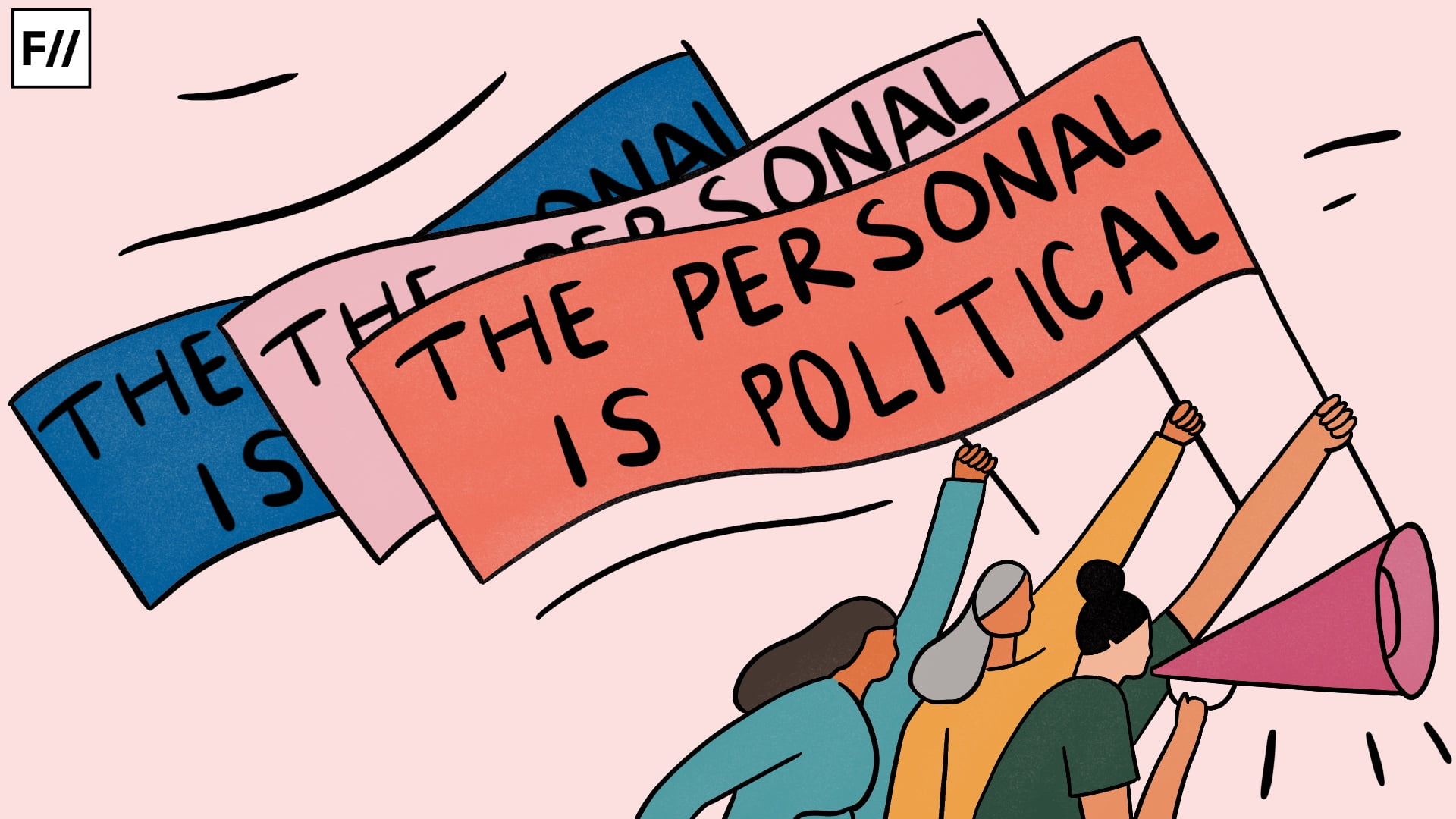The Personal is Political also termed ‘The Private is Political’ is a strong and provocative feminist outcry of activists from the second wave of feminism. It has since been associated with the feminist movement and has been used to challenge existing notion of the hierarchy between political and personal, and to emphasize the fact that deeply personal experiences are often shaped by existing political structures.
Coinage
The phrase was first used by Carol Hanisch as a part of the anthology Notes From the Second Year: Women’s Liberation in 1970. She used it in the context of consciousness-raising groups, where she defended the act of discussing with other women, experiences from within the household – something which was considered very personal.
In these groups, problems like childcare, problems in relationships and household duties were deemed to be highly political in nature. Hanisch argues in her essay that most problems that women faced in their day to day lives were actually a result of deep-rooted political structures that were patriarchal and intrinsically oppressive.
Hanisch argues that these consciousness-raising groups were a form of political action. She emphasizes on the fact that any relationship that has a power dynamic is a political relationship, even if it is within the realm of the ‘domestic’. The realization for women that their personal problems had a bigger political dimension associated with it, was an important milestone of the second wave. This was in response to broader accusations that women were responsible for their own situation.
Does this then mean that all personal actions or decisions that a woman makes, is a part of a greater political ideology or movement? And if so, where does one draw the line? Second wave feminists were often attacked for making choices like wearing makeup and waxing body hair as submitting to patriarchal oppressive measures.
Any relationship that has a power dynamic is a political relationship, even if it is within the realm of the ‘domestic’.
What once started out as a slogan for recognition of politics in day-to-day reality soon turned into a prescriptive dictum. Thus it came to be understood that the personal choices that a woman makes have to be aligned with the politics that she espouses.
Rahila Gupta in her article on the slogan focuses on the gap that feminists often face while dealing with questions of personal decisions being politicized. She talks about her experience of being accused of hypocrisy by her daughter when being asked to dress conservatively in places that are generally deemed unsafe.
She says, while she politically espouses women’s ownership over public spaces, she does concede that personal consideration of safety often overpowers her politics. She thus points out the glaring inconsistency between the personal and the political and the dangers of equating the two.
Collective Action
Here it would be useful to consider Carol Hanisch’s idea of collective action, where she propounds that personal problems of women often do not have a definite solution due to the fact that they emerge out of strong, discursive and oppressive patriarchal, political structures. The only way to deal with them is to see them as a collective and take action accordingly.
Also Read: How I Became An Activist: My Story Of Political Awakening
A prime example in question is Raya Sarkar’s ‘List’, an online list of sexual offenders in academia in India. Where personal experience was brought out due to the recognition of the greater political structures in play – whether it is gender, caste, class or an intersection of the three. The much-discussed ‘List’ is actually a collection of allegations on individuals that have been brought together to bring to light the underlying structures of patriarchy and caste. This can be seen as a resistance in the form of collective action, as postulated by Hanisch.
Much of the debate around this ‘List’ has been about ‘due process’ and the legitimacy. This is a direct attack on the ‘personal’ serving as evidence enough, questioning the lived experiences of the people who have been victims of such aggression and thereby attacking their shared memory of trauma, that emerges from experiences rooted in inexorable political structures.
Experience and the Empiric
This brings about another aspect of the slogan is its emphasis on experience and the empiric. If one’s personal experiences are indeed political, then who gets to write or theorize about these experiences? The idea of the personal and the political having a link has direct and revolutionary meanings when it comes to the issue of representation and voice.
What this basically implies is that only those sections of people who experience certain oppression personally can explain the politics around it. These groups of people, in question, are often marginalized and not let to speak. They are spoken on behalf of. The entire second wave was predicated on women speaking about their oppressive experiences.
If one’s personal experiences are indeed political, then who gets to write or theorize about these experiences?
Later the third wave carried the idea forward and spoke of experiences and identity as being intersectional, and hence adding new dimensions to the problem of representation. It identified that apart from gender politics – caste, class, sexuality, colour, body type, were all equally oppressive political structures that acted upon one another to create identities that held unique experiences and meanings. If these experiences are indeed political then it is only right that they voice their experiences that shape and get shaped by political structures.
Destabilization of the Hierarchies
The final dimension that I wish to address about the slogan is the destabilization of the hierarchy between the personal and the political. The political, the general, the overarching problems have always been at the higher side of the binary and are given more legitimacy in popular discourse as well as in individual issue-based movements.
The feminist movement changed how the personal was viewed viz-a-viz the political. It emphasized the importance of personal, what had previously been brushed aside as trivial and unimportant to the greater interests of the movement. This was a significant break from liberal democracy and its ideas of the public and private being two distinctive spheres. The second wave is indeed credited with redefining and challenging this divide and the notion that ‘outside’ interference is not desirable in the private sphere that is sacred and personal.
It has been over 47 years since the slogan first came to use. Since then it has revolutionized the lens that we use to view the empiric and theory. Indeed, the movement itself has evolved a long way from when it was first used, but some of its core considerations still remain. Hanisch wrote an introduction to her essay in 2006 where she beautifully sums up the debate around it. She says
“Political struggle or debate is the key to good political theory. A theory is just a bunch of words— sometimes interesting to think about, but just words, nevertheless—until it is tested in real life. Many a theory has delivered surprises, both positive and negative when an attempt has been made to put it into practice.”
Also Read: When The Personal Is Political: Inequality Within Marriage
About the author(s)
Sunaina Bose is a theatre enthusiast, pop culture junkie and an Austenmanic. In her free time (also when she’s procrastinating) she loves to take life changing quizzes like ‘What kind of pizza are you’.





The best article I’ve read about the entire debate around Raya’s list. The argument that the debate around ‘due process’ and ‘legitimacy’ is a direct attack on the ‘personal’ is brilliant!